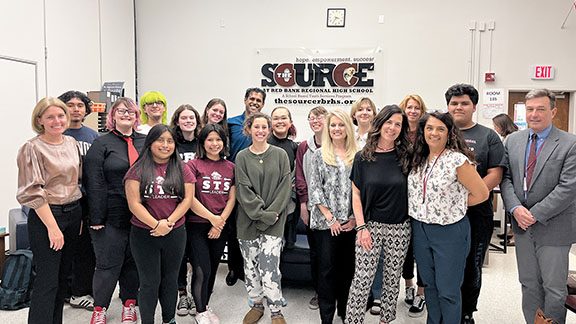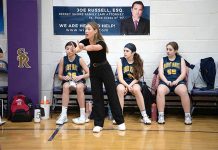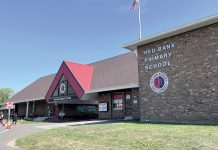
By Sunayana Prabhu
RED BANK – Advancing the conversation on youth mental health, Sen. Vin Gopal and mental health advocate Amy Kennedy dialed into student experiences to get a first-hand account of the impact of school-based youth services like The SOURCE at Red Bank Regional High School (RBR).
Students at RBR engaged in a round table discussion with Gopal and Kennedy April 27 to amplify the need for a “safe place” like The SOURCE in high schools which can be inherently judgmental places, noted RBR senior Elly O’Scanlon. “There’s literally nowhere to go where you’re not being judged,” O’Scanlon said, echoing nearly a dozen of her peers in the room who access The SOURCE to cope with mental health challenges throughout high school.
“It can be so beneficial for students to know that there’s somewhere they can go, where there’s not a pressure to exist a certain way,” she said.
Several students shared the challenges they face and the efforts they are making to help destigmatize mental health issues at the gathering, which included representatives from the Society for the Prevention of Teen Suicide, the Mental Health Association of Monmouth County, the YMCA of Greater Monmouth County, Shore House – a Long Branch-based club house supporting mental health – and The SOURCE staff members.
High school can be fun but it can be a “trigger” as well, said Adara Williams, another RBR senior who is learning to cope with post-traumatic stress disorder (PTSD) with the help of Marisol Mondaca, a bilingual clinician at The SOURCE. Williams pointed out that schoolwork, people you meet in school, the teachers, students, the energy in the building or just the environment itself can be overwhelming. The comfort of knowing The SOURCE is available is a “blessing,” Williams said.
Ricardo Mercado is the president of RBR’s National Honor Society. He said certain factors in high school “catalyze certain mental health issues,” referring to historical biases, undocumented students who don’t have insurance to access mental health, historically disenfranchised people who cannot seek mental health, and other stress factors in addition to peer pressures and academic challenges. But, he said, “You see how providing these mental health services can change these people’s life.”
According to findings from the Centers for Disease Control published as part of a school connectedness article on its website, youth who experience racism, youth from racial and ethnic minority groups, and youth who identify as LGBTQ+ often feel less connected at school. When schools focus on building connectedness with inclusive programs in classrooms and offer care and support services, youth are less likely to engage in risky sexual, violent or substance use behaviors.
To that extent, elected officials, educators and caregivers have been working with students and families grappling with a mental health crisis magnified by the COVID-19 pandemic and an added shortage of mental health professionals.
In the Fiscal Year 2024 budget report, Gov. Phil Murphy announced $43 million for the inaugural year of the NJ Statewide Student Support Services (NJ4S) network, a new model for delivering mental health services to New Jersey’s youth across the state. The program, a “hub-and-spokes” model, will create 15 regional hubs to support statewide student support services in schools, as well as in other locations in the community including libraries, community centers, faith-based organizations, and family success centers. However, this regionalized model would remove state funding for The SOURCE.
Allie Michalski, an RBR senior, thanked Gopal for his efforts in securing a one-time grant of $100,000 for The SOURCE from Murphy’s proposed 2024 budget. “The governor’s budget had cuts unfortunately for these programs and we were able to stop that,” Gopal said. “Access to therapy and counseling is probably one of our top priorities right now in the Senate.”
Kennedy, co-founder of The Kennedy Forum, an organization “dedicated to advancing quality mental health programming in schools,” is currently working with the National Governors Association (NGA) to develop mental health policy initiatives that could be helpful in every state. In July 2022 Murphy, the NGA chair, introduced the Strengthening Youth Mental Health initiative which has governors from across the nation collaborating to develop bipartisan solutions. Hearing from the students about their challenges with respect to funding, environment, immigration and other factors is crucial to that work, she said.
On Feb. 10 the CDC published a report which shows suicide rates among persons aged 10 to 24 increased significantly from 2018 to 2021, especially among Black persons – from 8.2 to 11.2; a 36.6% increase). Suicide rates also spiked in 2021 after a two-year decline in groups impacted by the pandemic.
“Suicidality (suicidal ideation or suicide attempts) among adolescents is a major public health concern, with suicide being the second leading cause of death among U.S. adolescents and young adults,” according to an investigative study published in June 2022 by the Journal of the American Medical Association (JAMA). The study concluded that cyberbullying is a significant factor in suicide risks, above offline aggression from peers.
The SOURCE is funded by the New Jersey Department of Children and Families, Division of schooling services, Red Bank Regional High School and The SOURCE Foundation, a nonprofit. Louis Moore, PhD., superintendent of RBR, said, “We know that the success of our students and the happiness of our students is significantly boosted by what The SOURCE brings.”
Moore said the funding received from the district and from state grants has “mental health at the center,” but there are other wrap-around services provided to the students year-round that make The SOURCE “a school-based social welfare agency.”
In addition to providing students with family counseling, the additional funding secured for this year will provide students with medical, dental, eye care and academic support, community education forums for parents and also a food pantry in the school.
RBR is home to approximately 1,300 students from sending districts Little Silver, Red Bank and Shrewsbury, but the school also receives students from many other districts to its academy programs. “Exposure to people who are different than you, I think it’s truly the best teacher of how to how to be kind,” O’Scanlon said.
The meeting concluded with some profound messages from the students, most whom are fierce advocates for mental health. “You don’t need to understand someone to respect someone,” said senior Loni Leslie.
The article originally appeared in the May 4 – 10, 2023 print edition of The Two River Times.














